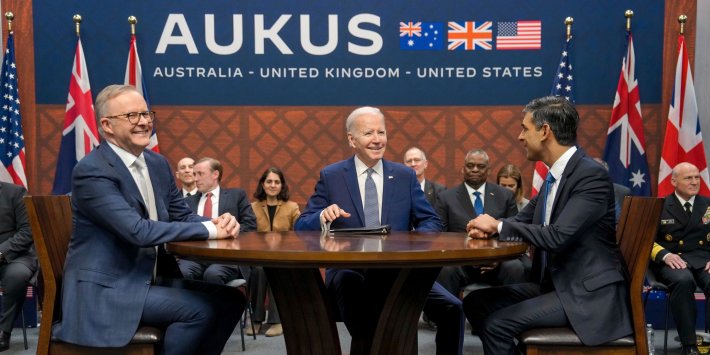On 13 March 2023, it was an auspicious day for the United States, Australia and the United Kingdom. In the warm spring sunshine of a San Diego shipyard, the leaders of our three nations gathered by the dockside to announce the next stage of the AUKUS partnership.
Meanwhile, some 5,000 miles and eight time zones away, with slightly less fanfare, I stood at the despatch box and explained the details to colleagues in the House.
One month on and the significance of that moment remains undiminished. This partnership will deliver the SSN-AUKUS – a nuclear-powered conventionally armed submarine based on the UK’s next-generation design that incorporates technology from all three nations. Australia and the UK will both operate SSN-AUKUS as their submarine of the future, with construction beginning at the end of this decade. The programme will be supported by an extra £5bn investment in UK defence, including £3bn specifically for the nuclear enterprise.
By the time the first vessels enter service in the late 2030s, not only will we have the ability to deter underwater threats, protect our nuclear deterrent and safeguard vital sea lines of communication, but we will have an enhanced future fleet – with these state-of-the-art submarines forming up alongside world-class aircraft carriers, frigates, destroyers and autonomous minehunters – helping us keep the oceans safe for all.
This landmark deal represents a watershed moment for global Britain – and it really is just the start
But what makes AUKUS so revolutionary are the less eye-catching announcements: the small print that only procurement ministers get exercised about. Over the past few years, as the threats have grown, western nations have wrestled with everything from rising equipment costs to skills gaps in critical industries. AUKUS will provide many of the solutions to those problems. In fact, it represents an entirely new type of defence and security partnership, focused on advanced capabilities.
It is a partnership between allies who share a profound commitment to liberal and open democracies and the rule of law. A partnership that will break down traditional barriers – be they bureaucratic, regulatory or cultural – and give us access to some of the most advanced technologies on the planet. A partnership that enables us to share the burden of research and development costs. And a partnership that integrates our industrial bases and supply chains to provide much greater resilience.
When the announcement was made, much of the spotlight fell on how the investment of billions more across our industrial infrastructure would create thousands of jobs. However, what is even more significant is the way it will grow our graduate and apprentice nuclear skills programmes. We are investing in the future so, decades from now, we will continue to have the advanced manufacturing skills essential for maintaining our technological advantage.
In other words, this landmark deal represents a watershed moment for global Britain – and it really is just the start. We are determined to deepen these kinds of relationships, whether it is our Global Combat Air Programme with Japan and Italy, or with the G7, the G20 or Nato.
In our Integrated Review Refresh we outlined how technology envoys and a new Technology Centre of Expertise will support sustainable economic growth around the world. At the same time, our membership of the Comprehensive and Progressive Agreement for Trans-Pacific Partnership, a vast free trade area of 11 countries, opens new doors to potential success.
It is for all these reasons that AUKUS should give us immense pride. The world might be getting more dangerous, but by forging a revolutionary relationship we will support our industries, strengthen our security and defend our values.
Alex Chalk, Conservative MP for Cheltenham and Secretary of State for Justice
Editorial Note: At the time of writing, Alex Chalk was serving as minister of state for defence procurement
Source: politicshome
















